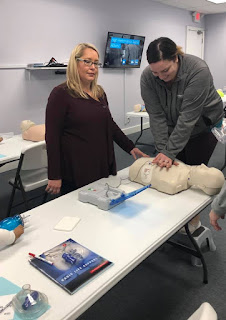A coronary bypass surgery is a major surgery that a patient undergoes which is considered the best treatment for cardiovascular disease. The body goes through a lot during the surgery which necessitates time to recover and regain strength. The recovery begins in the Intensive Care Unit (ICU) in the hospital which continues in another area of the hospital for 3-5 days prior to going home. After discharge, recovery typically takes six weeks or more.
The best way to handle out-of-hospital cardiac emergencies is by undergoing CPR training in a reputed training site like the AHA certified CPR Louisville in Kentucky. The procedures comprise chest compressions and rescue breaths. Administering the procedures properly can revive the life of a victim involved in life-threatening emergencies like a cardiac arrest or heart attack. There are courses for medical as well as non-medical professionals. Here are some points on a “PALS class Louisville”.
Pediatric Advanced Life Support Classes- This course has been designed for advanced healthcare providers that teaches a systematic approach to the assessment of a sick infant or child. Healthcare providers will be able to quickly identify and treat the pediatric patient’s injury or illness using the PALS evaluate-identify-intervene sequence. The course is led by American Heart Association certified PALS instructors with a critical care medical background.
The course fee is $297.
In the ICU Post Coronary Bypass Surgery:
A patient is moved to the ICU after the surgery because ICU’s are equipped to monitor the vital signs with the medical professionals there being well-trained in safeguarding more vulnerable patients. Anesthesia is used by the cardiac surgeon during coronary bypass surgery and a patient may not wake up from anesthesia for two to four hours. A patient during the time will continue to breathe through the breathing tube with help from a ventilator, a machine that moves air in and out of lungs which enables to breathe easily. The tube is removed only when the patient is being able to breathe on its own. A patient is unable to talk with the tube in place. Apart from that, several other tubes are attached as well, which are removed the day after surgery:
A Catheter- A catheter is inserted in the bladder which enables to monitor the urine.
Stomach Tube- This tube, which is inserted through the nose down to the stomach, prevents nausea and keeps air bloating the stomach.
IV Tubes supply fluids, medications, and blood as required.
An Arterial Line- This is used to monitor blood pressure and draw blood samples. It is a plastic needle in the artery of the arm.
Chest Tubes- The tubes are inserted after the completion of operation to drain fluids thus preventing accumulation of fluid in the chest cavity.
Join a CPR course at CPR Louisville and gain the benefits. You can either register online or call on 502-804-6132.


